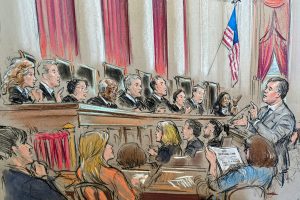
Editor’s Note: Patrick T. Brown is a fellow at the Ethics and Public Policy Center, a conservative think tank and advocacy group based in Washington, DC. He is also a former senior policy adviser to Congress’ Joint Economic Committee. Follow him on Twitter. The views expressed in this piece are his own. View more opinion on CNN.
CNN
—
This week the US Supreme Court heard oral arguments in a case that raised thorny questions over algorithms and free speech on the Internet. In Gonzalez v. Google, lawyers for the parents of a teenager killed in an Islamic State attack are arguing that YouTube should be held liable for promoting content from the group.
The political debates over how much speech protections online cover Big Tech firms have inflamed the right for years. In the oral arguments, at least, the justices seemed uncertain about how best to proceed with the complex issues at play.
But new research shows some issues surrounding tech don’t have a political divide. A new report I wrote for the Ethics and Public Policy Center and the Institute for Family Studies shows widespread concern around kids online. And a set of policy proposals that aim to restore parents’ ability to shepherd their kids on the wild west that is the Web all recorded high levels of support across parents from both political sides.
This issue is something that nearly every parent has to navigate. A recent report from Common Sense Media found that the average age of first exposure to pornography is now 12, and that three-quarters of teens had seen porn online by age 17.
But parents have plenty to worry about kids online in addition to early exposure to pornography. All manner of online content can impact a child’s life. As this week’s Supreme Court case reminds us, youth can be lured into extremism or self-harm via online content. Parents might want to know if their child is becoming increasingly drawn toward figures who share racist or misogynistic views online.
Documents released by a whistleblower indicated Facebook’s (now known as Meta, Instagram’s parent company) internal data showed the site made “body image issues worse for 1 in 3 teen girls,” and also led to more severe and self-destructive thoughts. While the company disputed the claims, it also postponed an “Instagram for Kids” offering. Cyberbullying and non-consensual nude photo sharing have plagued high schools.
These concerns are resonating with policymakers. Current law and decades of Supreme Court precedent establish much more leeway for Congress to protect kids online without having to hash out the complexities of more wide-ranging free speech concerns.
A bipartisan effort to take modest steps to protect kids online might bear fruit. Republican Sen. Marsha Blackburn of Tennessee and Connecticut Democrat Sen. Richard Blumenthal have been pushing their colleagues to pass their Kids Online Safety Act (KOSA), which would update the framework for how tech companies serve minors online.
Among other things, it would require social media sites to default minors into the strongest possible privacy protections and give parents new tools to monitor harmful content. It would mandate social media platforms mitigate harms to minors, such as by restricting or eliminating content relating to self-harm, suicide and eating disorders. And it would set up require an annual audit of risks to minors, including providing broader data access to researchers to study the impact of social media on kids’ development.
The bill was opposed by some civil rights and LGBTQ groups, who worried that putting greater content restrictions on what kids may come across online could prevent them from accessing information about sexual education without their parents’ knowledge. But that concern may ring hollow with parents who believe they should have better tools to know if their 13- or 14-year-old child is searching for information about birth control.
Some say parents should be the ultimate gatekeeper of their kids online, which is true. But we have laws relating to the minimum age to consume alcohol or drive a car precisely because we know adolescents’ brains are still developing, and the potential to cause harm to oneself or others is high. After all, unless a critical mass of families agree to move social life offline, minors who don’t have access to Instagram, TikTok or Facebook may be missing out on crucial information or opportunities to socialize.
Moreover, while some tools exist for helping keep kids safe online, they are often easily circumvented. Asking individual parent to be an expert on the plethora of user settings, filters and options for keeping age-inappropriate content away from their kids places an undue burden on families. Establishing age-based controls, and policing them effectively, would be an appropriate step for Congress to take.
Indeed, some say the Blackburn-Blumenthal framework doesn’t go far enough. The policy solutions polled in our recent report are more aggressive than those included in KOSA, and still receive support from three in four parents.
For example, nearly 9 in 10 Republican parents, and 77% of all parents, agreed with a proposal to require social media platforms to grant parents full access to what their children are seeing and who they are communicating with online, the most popular policy polled among that subgroup. 81% were in favor of a law that would require social media platforms to get parents’ permission before allowing minors to open an account. Another two-thirds of parents agreed or strongly agreed that internet service providers should be required to obtain age verification (like a drivers’ license or credit card) before allowing individuals to view pornography.
Future action will likely take up these concerns. Just last week, Republican Sen. Josh Hawley of Missouri introduced a bill that would bar users from under age 16 from opening a social media account. While the implementation mechanism would likely need to be improved on – relying on Big Tech companies to keep copies of every American’s drivers’ license safe may not work out – the direction of the legislation is laudable, recognizing that American parents are looking for bold action when it comes to keeping kids safe online.
The battles over Big Tech and accusations of algorithmic bias may be what gets the Republican base riled up. But in a divided Congress, both parties should listen to the parents who make up their base – giving families more tools to protect their kids online is not only long overdue, it’s a political winner.




